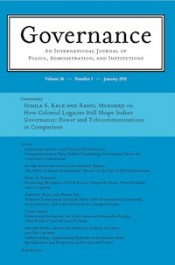
In the 1990s, the International Monetary Fund argued that the free flow of financial capital across borders was a “one size fits all” remedy to many macroeconomic problems. But the IMF shifted its position after the global financial crisis, conceding that capital controls might sometimes be justified. Why did the change happen? In the current issue of
Governance,
Kevin Gallagher of Boston University examines the role of the BRICS nations — Brazil, Russia, India, China and South Africa — in challenging the prevailing wisdom. The IMF was receptive to this challenge because its key economists were already engaged in a “profound rethinking” of existing policies. Industrialized nations were “caught off guard” by the changes that resulted from the coincidence of these two factors. Read the article.
Like this:
Like Loading...
Related
 In the 1990s, the International Monetary Fund argued that the free flow of financial capital across borders was a “one size fits all” remedy to many macroeconomic problems. But the IMF shifted its position after the global financial crisis, conceding that capital controls might sometimes be justified. Why did the change happen? In the current issue of Governance, Kevin Gallagher of Boston University examines the role of the BRICS nations — Brazil, Russia, India, China and South Africa — in challenging the prevailing wisdom. The IMF was receptive to this challenge because its key economists were already engaged in a “profound rethinking” of existing policies. Industrialized nations were “caught off guard” by the changes that resulted from the coincidence of these two factors. Read the article.
In the 1990s, the International Monetary Fund argued that the free flow of financial capital across borders was a “one size fits all” remedy to many macroeconomic problems. But the IMF shifted its position after the global financial crisis, conceding that capital controls might sometimes be justified. Why did the change happen? In the current issue of Governance, Kevin Gallagher of Boston University examines the role of the BRICS nations — Brazil, Russia, India, China and South Africa — in challenging the prevailing wisdom. The IMF was receptive to this challenge because its key economists were already engaged in a “profound rethinking” of existing policies. Industrialized nations were “caught off guard” by the changes that resulted from the coincidence of these two factors. Read the article.